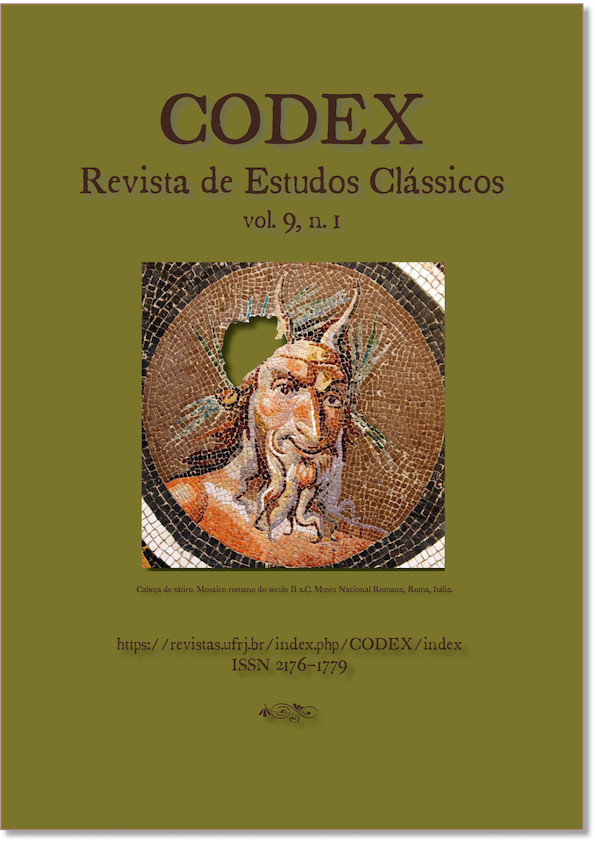A primeira epístola salustiana a César sobre a República: introdução, tradução e notas
DOI:
https://doi.org/10.25187/codex.v9i1.30751Parole chiave:
prosa latina, Salústio, declamatioAbstract
Apresenta-se aqui a tradução da Primeira Epístola a César sobre a República, atribuída ao historiador romano Salústio, à qual logo se acrescentará a versão da Segunda epístola também atribuída ao historiador. Na introdução, após discutir brevemente o problema da autenticidade e do gênero dos textos, as Epístolas serão abordadas a partir de sua relação com a declamatio, procedimento que consistia na composição de um falso discurso, em que o autor assumia a figura de outra pessoa, não raro imitando os grandes prosadores do passado. A partir dessa noção, mostrar-se-á como as epístolas tomam elementos das obras historiográficas de Salústio para construir para construir um discurso parenético. A tradução virá acompanhada de um texto em latim e de notas explicativas.
Downloads
Riferimenti bibliografici
BERTÒLA, M. I due primi Registri di prestito della Biblioteca Apostolica Vaticana: codici vaticani latini 3964, 3966. Città del Vaticano, 1942.
BONNER, S. F. Roman Declamation in the Late Republic and Early Empire. Liverpool: The University Press, 1949.
COSTRINO, A. A lição dos Declamadores: Sêneca, o rétor, e as Suasórias. Dissertação de Mestrado. São Paulo: Universidade de São Paulo, 2010.
DIHLE, A. Zu den epistolae ad Caesarem senem. Museum Helveticum 11, 1954, pp. 126-30.
FEDDERN, S. Die Suasorien des älteren Seneca: Einleitung, Text und Kommentar. Berlin: de Gruyter, 2013.
GEBHARDT, O. Sallust als politischer Publizist während des Bürgerkriegs. Halle: Karras und Koenneke, 1920.
JACHMANN, G. Die Invektive gegen Cicero. Miscellanea Academica Berolinensia II. Berlin, 1950, pp. 235-75.
JORDAN, H. Die Ueberlieferung der Reden und Briefe in Sallust’s Historien. Rheinisches Museum für Philologie 18, 1863, pp. 584-93.
LAST, H. M. On the Sallustian Suasoriae. The Classical Quarterly 17, 1923a, pp. 87-100.
__________. On the Sallustian Suasoriae-II (Continued). The Classical Quarterly 17, 1923b, pp. 151-162.
LIPSIUS, J. Variarum Lectionum libri III. Antverpiae: 1585.
MANOEL, R. G. Teoria e prática: estudo e tradução das epístolas e invectivas de Pseudo-Salústio e Pseudo-Cícero à luz dos Progymnásmata. Dissertação de mestrado. São Paulo: Universidade de São Paulo, 2014.
MEYER, E. Cäsars Monarchie und das Prinzipat des Pompejus. Stuttgart-Berlin: 1918.
NOËL, M.-P. La forme des premiers manuels de rhétorique: des technai logon à la Rhétorique à Alexandre. Pan. Rivista di Filologia Latina, n. 1, 2012, pp. 59-70.
PLATÃO. Fedro. trad. e apresentação de José Cavalcante de Souza, posfácio e notas de José Trindade Santos. São Paulo: Editora 34, 2016.
ROLFE, J. C. Sallust. Cambridge, MA: Harvard University Press, 1921.
C. SALUSTII Crispi Quae Exstant. vol. II. edidit Franciscus Dorotheus Gerlach. Basileiae in Libraria Schweighauseriana, 1827.
C. SALVSTI Crispi Catilina, Iugurtha, Historiarum, Fragmenta Selecta, Appendix Sallustiana. Recognouit Adnotationeque Critica Instruxit L. D. Reynolds. Oxonii E Typographeo Clarendoniano, 1991.
REYNOLDS, L. D. (ed.) Texts and Transmission: A Survey of the Latin Classics. Oxford: Oxford University Press, 1983.
RUSSELL, D. A. Greek Declamation. Cambridge: Cambridge University Press, 1983.
SANTOS, G. C. d. Arte e imitação nas Epistulae ad Caesarem. Tese de doutorado. São Paulo: Universidade de São Paulo, 2012.
SYME, R. Salluste. trad. de Pierre Robin. Paris: Les Belles Lettres, 1982.
##submission.downloads##
Pubblicato
Come citare
Fascicolo
Sezione
Licenza
A Codex - Revista de Estudos Clássicos utiliza uma licença Creative Commons - Atribuição-NãoComercial 4.0 Internacional.
Os autores dos trabalhos aprovados autorizam a revista a, após a publicação, ceder seu conteúdo para reprodução em indexadores de conteúdo, bibliotecas virtuais e similares.
A revista se permite o uso dos trabalhos publicados para fins não comerciais, incluindo o direito de enviar o trabalho para bases de dados de acesso público.










